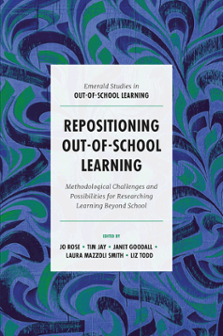
Index
Repositioning Out-of-School Learning
ISBN: 978-1-78769-740-9, eISBN: 978-1-78769-739-3
Publication date: 21 January 2022
Citation
(2022), "Index", Rose, J., Jay, T., Goodall, J., Mazzoli Smith, L. and Todd, L. (Ed.) Repositioning Out-of-School Learning (Emerald Studies in Out-of-School Learning), Emerald Publishing Limited, Leeds, pp. 203-207. https://doi.org/10.1108/978-1-78769-739-320211019
Publisher
:Emerald Publishing Limited
Copyright © 2022 Jo Rose, Tim Jay, Janet Goodall, Laura Mazzoli Smith and Liz Todd. Published under exclusive licence by Emerald Publishing Limited
INDEX
- Prelims
- Introduction
- Case Studies
- Chapter 1 Case Study 1 – Out-of-School Activities and the Attainment Gap: A Mixed Methods Exploration of Secondary Data Analysis with Narrative Intersectional Analysis
- Chapter 2 Case Study 2 – Developing Citizenship and Personhood through a Youth Sports Charity Programme
- Chapter 3 Case Study 3 – Researching the Unknown: Developing an Understanding of Children's Informal Mathematical Activity
- Chapter 4 Case Study 4 – Rhizomic Ethnography: Exploring the Lived Experience of an After-school Minecraft Club
- Chapter 5 Case Study 5 – Research Co-production with Young Women through an Out-of-School Residential Trip
- Chapter 6 Case Study 6 – Researching Geographies of Youth Work
- Chapter 7 Case Study 7 – Reflections on Position: Relational Agency in Researching ‘Everyday Maths’
- Chapter 8 Case Study 8 – Destabilising Methodologies: Working toward Democratic Parent Engagement
- Chapter 9 Case Study 9 – Using a Collaborative Theory of Change Approach for Evaluating Out of School Learning
- Thematic Chapters
- Chapter 10 Theme 1: Negotiating the Researcher Role in Out-of-school Learning Research
- Chapter 11 Theme 2 – Building Relationships, Building Structure: Working Together in Research on Out-of-school Learning
- Chapter 12 Theme 3 – The Authenticity and Value of Knowledge
- Chapter 13 Theme 4 – Emplacing Learning, Emplacing Research: Performances, Power and Inequalities
- Chapter 14 Theme 5 – A Beautiful Mess: Keeping Hold of Messiness and Complexity in Research
- Chapter 15 Theme 6 – Ethical Practice in Out-of-School Learning
- Chapter 16 Theme 7 – Slow Down: Relationship Building and Slow Research in Settings for Non-formal Learning
- Concluding Thoughts
- References
- Index